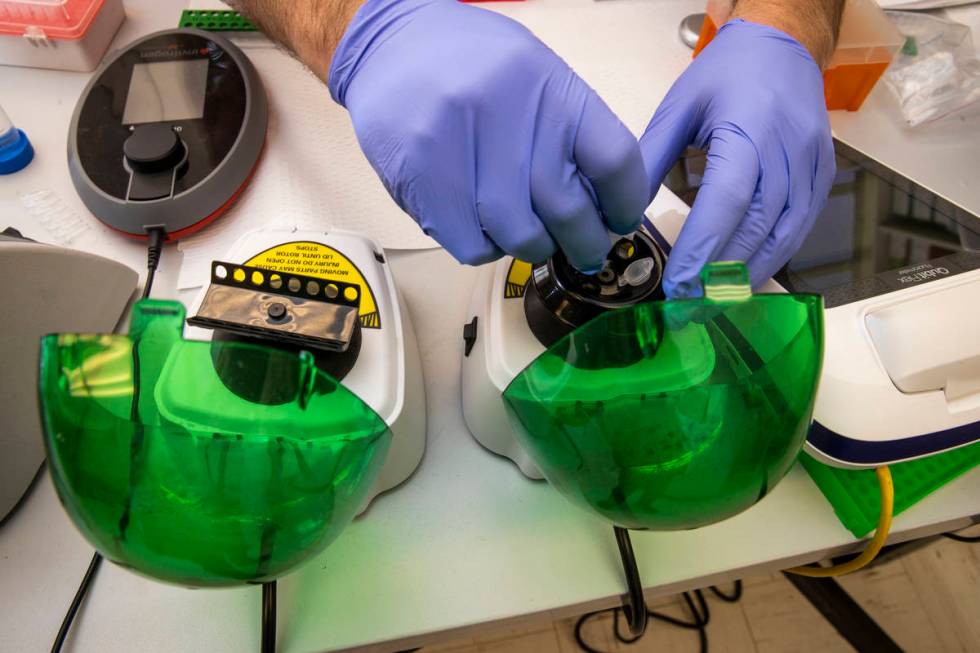First Nevada cases of ‘delta plus’ variant detected in Clark County

The first cases in Nevada of a coronavirus variant known as delta plus, the newest strain to worry health officials, have been identified in Clark County, according to the Nevada State Public Health Laboratory.
Three cases of the variant, a mutant of the highly contagious delta variant that originated in India and has swept across the globe, were identified through analysis of samples from positive COVID-19 tests collected June 15 in Clark County, according to a report this week.
So far, these are the only cases of delta plus that have been identified by the state lab through sequencing, where the order of a virus’ genetic code is analyzed, said Mark Pandori, director of the lab at the University of Nevada, Reno, School of Medicine.
“We haven’t seen any significant developments, like explosions, or any cases beyond those three yet,” he said.
Pandori said it is likely just a matter of time before delta plus, also referred to as AY.1, is categorized as a “variant of concern” by the Centers for Disease Control and Prevention, which already has placed the delta variant in this category with a few other strains.
“Because it’s really just the delta variant with an additional spike mutation that is seen in other variants of concern,” he said.
Familiar mutation, new strain
The spike protein is the mechanism by which the coronavirus virus attaches itself to and then enters cells, leading to infection. The mutation, referred to as a K417N, is also found in the beta variant of concern first identified in South Africa, according to the CDC.
It’s unknown whether the delta plus variant is more dangerous than the delta variant, which is highly transmissible and is thought to have a somewhat increased ability to infect people who have been vaccinated.
“One would hypothesize only that it is at least as infectious and … (has) the immune evasion capabilities of the delta variant,” Pandori said. “Whether or not it has any ability on top of that is not known.”
The delta strain now accounts for nearly half of Nevada’s cases analyzed by the lab in the past two weeks, indicating it is now the most widespread strain in the state.
On Thursday, Washoe County reported its first known death from the delta variant, that of an unvaccinated woman in her 40s with no underlying health conditions. The strain of coronavirus responsible for a death is data typically not reported by health districts, including the Southern Nevada Health District.
As of Thursday, Nevada had the highest rate in the country of new cases of the coronavirus per 100,000 population.
Based on data for a two-week period ending June 19, the delta variant was estimated to be the second-most-prevalent strain nationwide, and dominant in some regions, CDC representative Jade Fulce said in an email. The dominant variant nationwide previously had been the alpha variant first identified in the U.K.; it also is called B.1.1.7.
Fulce could not say how many cases of delta plus have been reported nationwide, noting that data on this variant is not aggregated separately from records on the delta variant.
CNN reported this week that about 200 cases of the delta plus variant had been reported in 11 countries, including the U.S.
The delta blues
Concern over the rapid spread of the delta variant led officials in Los Angeles County on Monday to recommend that everyone, vaccinated or not, resume wearing masks in indoor public settings.
Dr. Fermin Leguen, district health officer for the Southern Nevada Health District, said Wednesday that there had been no discussion of again requiring face masks or imposing other restrictions in Clark County to fight the rise in cases.
Also on Wednesday, CDC Director Dr. Rochelle P. Walensky reiterated the federal health agency’s guidance from May that vaccinated individuals need not wear masks in most settings. However, she also said it is appropriate for officials in areas with low levels of vaccinations and rising infection rates to make their own policies at the local level.
In Nevada, about 53 percent of those 12 and older, the population eligible for vaccination, has received at least one dose of vaccine, state data shows — considerably lower than the national average of 64 percent. In Clark County, the percentage is about 56 percent.
In lieu of new restrictions, the health district is pressing more residents to get vaccinated to guard against more dangerous variants.
“The health district reminds the community that the best thing that people can do to protect themselves is get vaccinated,” representative Stephanie Bethel said in an email. “People who are not vaccinated should wear masks in public settings.”
Information on vaccination sites can be found at www.snhd.info/covid-vaccine and at www.NVCOVIDFighter.org.
Contact Mary Hynes at mhynes@reviewjournal.com or 702-383-0336. Follow @MaryHynes1 on Twitter.